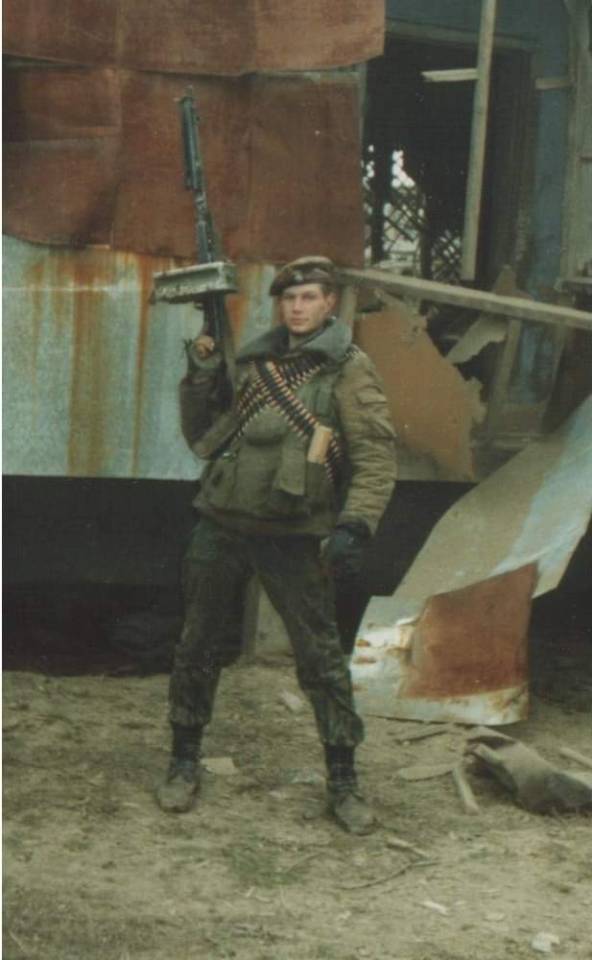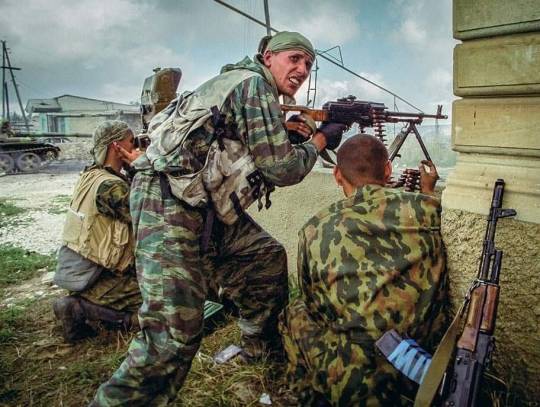#first chechen war
Video
First Chechen War, Second Battle of Grozny, an encircled Russian unit desperately request air support to no avail, even directly talking to a nearby helicopter pilot. The unit was overrun and destroyed shortly after.
76 notes
·
View notes
Text

Tank operator in the First Chechen War, 1994-1996.
8 notes
·
View notes
Note
I hope I’m not bothering you by asking (i saw you receive a previous ask about it), but I was wondering why is it that the narrative around caucasian (especially chechnyan) people being called terrorists is so easily accepted by tankies; like i know the reason “why” (because America Bad™ is all those idiots repeat ad nauseam) but not the “how.” There’s a lot of information regarding muslims and arabs and people know how that is often framed to justify american and general western violence against them; but there’s not a lot of info about chechnyans that hasn’t been filtered through a russian lens and a lot of people seem to be perfectly fine with that. How on earth did that happen?
I think you've answered your question already - prejudice against foreigners (especially Muslims) + distrust of the mainstream western media + lack of info that hasn't been filtered through a russian lens. But I will try to add more details.
(full disclaimer I was a small bebé during these times so everything I know I have learned many years after these events have occurred)
I. During the First Chechen War, russia has not yet established itself as a media monopolist, which has led to them losing the informational war. A lot of journalists, including the russian ones, had covered the events on the Chechens' side. In both russian and western media, there were two narratives - about the russian government fighting terrorism, but also about the Chechens fighting for independence. Russia has learned from its mistakes, and by the time of the Second Chechen War, it went full-on with the informational war. They have established the russian Informational Centre to coordinate the media coverage of the conflict. Just before the invasion, the russian government committed several terrorist attacks in moscow, volgodonsk and makhachkala and blamed them on the "terrorists" to get an official justification for the invasion & to get the support of the population. They have also had an unprecedented xenophobic campaign in the media. This time, any journalist who wanted to cover the war had to be accredited by the russian government, which meant that only those who agreed to promote their version of the events were allowed in. This included the foreign parites, e.g. abc got banned from entering Chechnya. This gave russia a full control of the narrative.
Add to these circumstances the fact that we are talking about times preceding wide internet access. We can see today how differently the russian army acts when their actions can be caught on camera vs when they have the protection of the informational void. Without access to unbiased outlets, the Chechen side of the war was slienced. As a result, the narrative of "bloodthirsty barbaric terrorists that russia just had to destroy for their own protection" became the only one.
The current clan ruling the region (infamous kadyrovtsy), are de-facto collaborators of the russian regime.
The reaction of the west, typically, was weak and unimpactful. PACE has issued two recommendations that justified russia’s actions in the Chechen Republic. In 2000 they revoked the russian delegation’s voting rights, but completely reverted them within a year. OSCE mission had worked for a year and then got kicked out.
A sidenote: I asked my mom about her memories of that time. She lived in Taganrog (southwestern russia), which had a significant population of caucasian people - approx. 60% of her colleagues were from that region. According to her, people believed caucasians instead of russian media. I can't say for sure if it was the same or different in other regions, but my educated guess would be that more monogenous and marginalised regions would be more likely to belive the official narrative.
II. Like you've mentioned, it is a well-known fact in the leftist circles that Muslim people are often framed to be terrorists to justify violence against them; and, therefore, we have a kind of expectation that people who support these ideals would not fall for islamophobic propaganda as easily. Unfortunately, the psychological aspect says that our awareness of prejudices does not always help us overcome them. In psychology, there is a distinction between two types of biases - explicit and implicit ones. Explicit biases are those presented by open racists. Implicit biases can be carried by people who are outwardly non-xenophobic and can even be a part of the social justice movement. However, unconscious prejudices can still influence their attitudes and behaviour. In this case, it would mean that they would be more likely to believe that Chechens were terrorists and russia's actions were justified.
III. If we are talking about tankies specifically, they have a long-standing bromance with the russian state-sponsored media. From what I've read, it dates back to the times of the "Occupy Wall Street" movement. Russia Today (RT) channel, created after the failure of the informational war in Chechnya, has given voices to the most fringe leftist organisations that weren't taken seriously by the more established media outlets. Later the relationship was strengthened during the Snowden and Assange events. RT has gained the tankies' trust by giving them a free platform, and through this trust, they have started feeding them any narrative kremlin wanted - about Chechnya, Libia, Syria, Ukraine or any other country.
And this does not even touch the fact that kremlin has been founding many far-left and far-right european & american parties and think tanks for years.
Hope this helps)
#response#russia#chechnya#chechen war#first chechen war#second chechen war#russian agression#this is very broad strokes but i hope it will suffice#if anyone can share good sources in english please leave them in comments or reblogs
36 notes
·
View notes
Text
A decade ago, when foreign fighters were flowing into Syria, the Islamic State’s capital, Raqqa, became a sort of Epcot of global jihad: New arrivals from different nations clustered together in their national groups. If you were a recent arrival from France or just wanted to know where to get a croissant, you could visit a café full of French people and ask. Tens of thousands of foreign fighters came from places as distant as Chile and Japan. Russia alone contributed as many as 4,000, according to President Vladimir Putin, and by all accounts, their cluster focused not on pastry but on warfare. The only countries that put up numbers to rival Russia’s were Tunisia and Turkey.
Yesterday, terrorists murdered at least 133 concertgoers in suburban Moscow. The Islamic State’s news agency, Amaq, posted the group’s claim of responsibility, as usual in language balanced between wire-service precision and rabid derangement. The claim described an attack “against a large gathering of Christians”—an odd way to describe a nonreligious prog-rock concert. Videos from the scene show gunmen firing into piles of huddled civilians and stalking others. The style resembles the Bataclan massacre, which ISIS perpetrated in Paris in 2015, and the October 7 attack, the handiwork of ISIS’s enemy Hamas. The Amaq report says the killers “withdrew to their bases,” which suggested that they remained at large and capable of attacking again, and that they had more than one base. By Saturday, Russia claimed to have arrested all four perpetrators and several accomplices. Putin suggested the killers had been on a run for the Ukrainian border.
In Russia, as in many authoritarian states, rumors proliferate fast after shocking events like this. Many repeated the crazy theory that ISIS was deliberately invented by America. The exiled chess master and dissident Garry Kasparov suggested that Russia had attacked itself to drum up ethnonationalist sentiment. Putin’s intimation of Ukrainian involvement makes little sense to me. It beggars belief that the most hunted men in Russia would immediately drive in a white Renault toward the most heavily militarized and monitored zone in the entire region when they could drive in any other direction and be alone in a birch forest somewhere. But Putin’s version is consistent with the theory that he will use the attack to demonize Ukraine.
Everything we know about Russia and its history with ISIS supports the theory that ISIS perpetrated the attack. ISIS has been reviving its capacity, particularly in its Khorasan affiliate, the one identified by U.S. intelligence as responsible for the attack. Islamic State Khorasan Province “has taken on a more central role in planning attacks abroad,” Tore Hamming, a jihadism researcher at the risk-management consultancy Refslund Analytics, told me by text. He said a number of recent events, such as the arrests of suspected members in Turkey, suggest that the group is planning attacks outside its usual area of operations.
ISIS had a huge Russian and Central Asian contingent in its heyday. And the fault lines in Russian politics and society have foretold this kind of atrocity for literally centuries. It would be a surprise if four guys piled into a car and sped toward Ukraine after committing mass murder. Nothing could be less surprising than an ISIS attack in a region susceptible to just such an attack.
About one out of every five Russian citizens is Muslim, but that population is not evenly distributed either geographically or socioeconomically. In cities, a lot of taxi drivers and hard-luck laborers have names like Magomedov and Ismailov, indicative of Muslim ancestry. Many have roots in majority-Muslim Central Asian countries and have come to Russia in search of jobs. A very large proportion of the ISIS fighters from those countries came through Russia and developed violent tendencies there, away from the moderating influence of friends and family. The four alleged perpetrators arrested by Russia are reportedly from Tajikistan, a Central Asian republic bordering Afghanistan.
The center of geographic gravity of Islam in Russia is the Northern Caucasus, the site of domestic strife and bloodshed in a series of episodes going back centuries. In lieu of perfecting croissants, some groups around Dagestan and Chechnya have become proficient guerrilla warriors, and Putin perfected his own harsh methods on them during the Chechen Wars of the 1990s and 2000s. Those wars ended with a decisive Russian victory and the installation of micro-Putins, such as Ramzan Kadyrov, so that Moscow could rule Chechnya indirectly. These figures’ loyalty is such that two years ago, in the early days after the invasion of Ukraine, Kadyrov’s Chechen fighters were among the first deployed to fight on Putin’s side.
The problem is that decisive victories are never as decisive as they seem. Most residents of formerly restive regions in the Caucasus enjoy peace as much as anyone. But discontent is easy to detect. On my last visit to Dagestan, a taxi driver sheepishly turned down his music player when a jihadist song came on. Some people remain eager to fight.
The rise of ISIS was useful for Russia, which could imagine no better destination for its domestic jihadists than a faraway conflict with a conveniently high mortality rate. Anyone so inclined could go to Iraq or Syria with Moscow’s tacit blessing. That is one reason the number of ISIS members coming from Russia was so high: They were more or less permitted to go, so that they would self-detonate or run into machine-gun fire there, rather than make trouble within Russia’s borders. Many of those who went are now dead, as hoped. Some are not, and many of those have not lost their fervor. They just need a new object for it.
The connection between Russia and ISIS is, in other words, overdetermined. The cruelty of the killing and even the choice of venue—a concert hall—are all awfully familiar to anyone acquainted with jihadism in Russia. What comes next will be familiar too. The horrific videos and claims of responsibility have already arrived. Next will be a brutal reply from the Russian state. Whether that reply will be addressed to the attack’s actual authors is an open question.
#current events#history#military history#politics#russian politics#first chechen war#second chechen war#war against the islamic state#crocus city hall attack#russia#islamic state#chechnya#vladimir putin
0 notes
Text
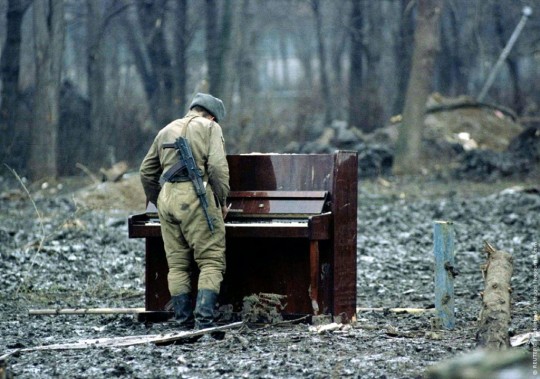
𝔄 ℜ𝔲𝔰𝔰𝔦𝔞𝔫 𝔰𝔬𝔩𝔡𝔦𝔢𝔯 𝔭𝔩𝔞𝔶𝔦𝔫𝔤 𝔞𝔫 𝔞𝔟𝔞𝔫𝔡𝔬𝔫𝔢𝔡 𝔭𝔦𝔞𝔫𝔬 𝔦𝔫 ℭ𝔥𝔢𝔠𝔥𝔫𝔶𝔞 𝔦𝔫 յգգկ
#Russian soldier#russia#soldier#Chechnya#90s#90's#1994#The First Chechen War#1994 to 1996#music#piano#photography#photo
166 notes
·
View notes
Text
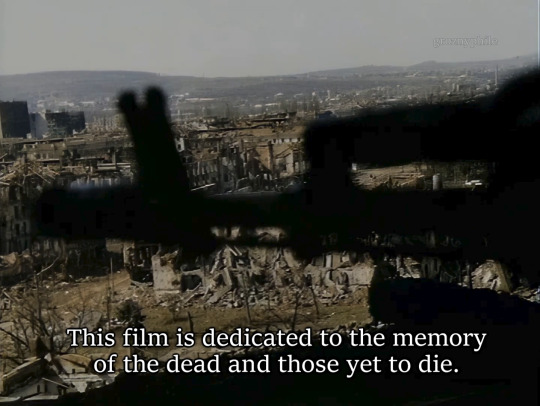
#cursed and forgotten (1997)#is the documentary it's from#it's about the first chechen war#nominally#but the director feels like he's slowly radicalising toward fascism
19 notes
·
View notes
Text

Freedom or death
Chechnya is the subject of Allah
6 notes
·
View notes
Text

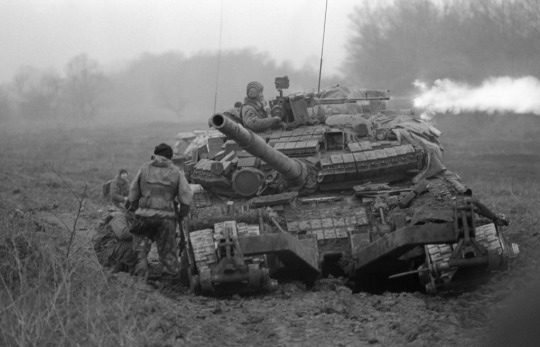
The First Chechen War, 1994-1996.
5 notes
·
View notes
Text

lüralla/fury
29 years ago the first Russian-Chechen war began. after 29 years in the war with the Russian occupiers, I am now the granddaughter of deportees, the daughter of a father who was tortured by the Russian occupiers and a sister of a brother who died in the battles for the independence of Ichkeria.

lazar/pain
Russia had brought immense pain to Chechnya and after being left unpunished - brought it to Ukraine too.
a Chechen boy after seeing Russian terrorist attack on Vinnytsia and little girl Liza said: I was killed in 2000 by a bomb and I have been leaving in a hell ever since.
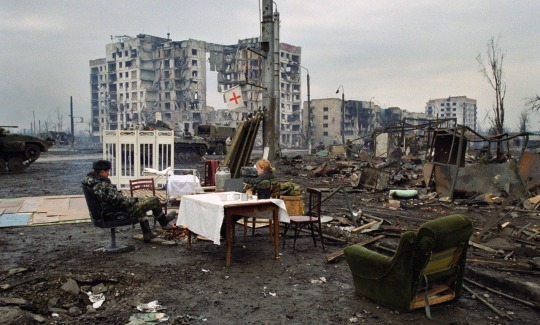
xag/hatred
a soldier from the Sheikh Mansur battalion teaches me, a civilian women: we don't speak with the occupiers, we kill them.
remember the ruins of Grozny, kill the occupiers.
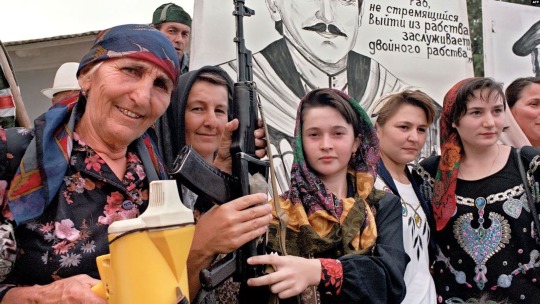
diccadalar/memory
grandmother, the “child of lentils”, who survived deportation, two wars and died under the Russian occupation, had forgotten everything in the last two years of her life—everything at all. all the pain and all the horror that Russia brought into her life. but memory in today’s world is also resistance.

beqam/retribution
there will be retribution. retribution to everyone who came to kill to the land of Ichkeria and to the land of Ukraine.
but I hope that I will be the last generation of my family who has to fight with the Russian world. The rashist terrorist federation must die.
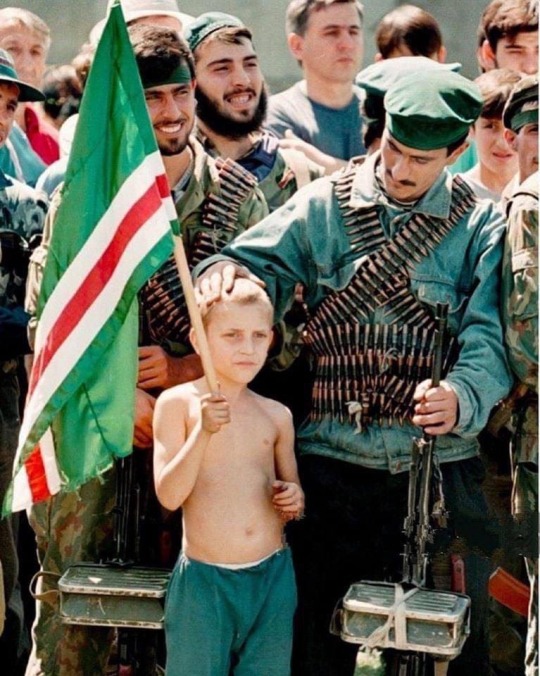
düẋalo/resistance
today three generations of Chechens are fighting for Ukraine and Chechnya - those who fought in the first Russian-Chechen war, those who fought in the second one and children for whom this war became the first in their life.
on the picture taken somewhere in the 1990s is the battalion commander of the Sheikh Mansur battalion, Muslim Cheberloevsky.
(read here)
181 notes
·
View notes
Text
So russians have made, published and are happily sharing online a video of them beheading a Ukrainian soldier. While he is still alive. With a knife. A few months earlier they posted a video of castrating a Ukrainian POW.
They brag about it, they are cheering this on. Because they have been doing all of these things with impunity for ages. They did the same things in Syria. They did the exact same things in Chechnya, during the first and second Chechen wars. And to all you "this is all Putin's fault!" fans - the first Chechen war was before Putin had even gained any political prominence. This is just the russian culture the collective west is still so in love with. This is what y'all love.
I wish to all russians to hear nothing but the screams of their victims for the rest of their lives. To wake up after hearing them in their nightmares and still keep hearing them.
Russia must burn in the deepest pits of hell.
475 notes
·
View notes
Text
The Russian state using ethnic minorities as cannon fodder - with a focus on Buryats
Article written in 2022, update on the Free Buryatia Foundation in September 2023 given at the end of the post.
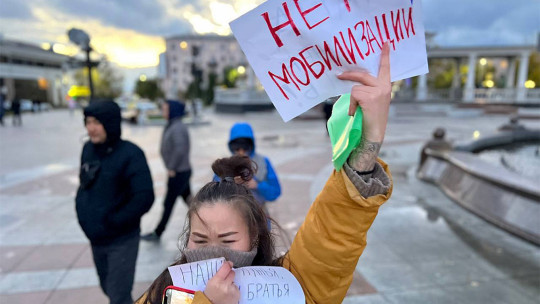
Putin announced on October 14th 2022 that by the end of October, his partial mobilisation process would be complete
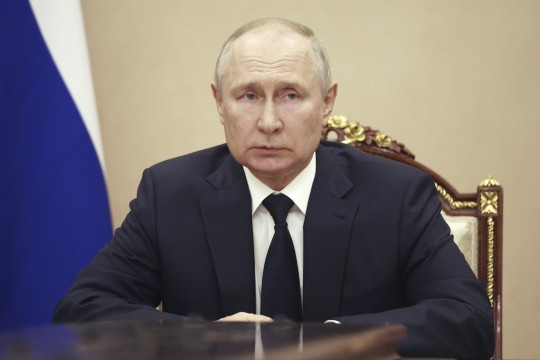
The recruitment target was 300,000. 222,000 were recruited, and it was claimed that there'd be no more plans for future recruitment
The mobilisation process soaked nation wide outrage which lead to mass protests.
It drew in criticism from some of the Russian political elite
The mobilisation process disproportionately affected ethnic minorities/impoverished regions (many impoverished regions have a high ethnic minority population)

Tuva Republic
Regions that held high populations of ethnic minorities bared the brunt of war-related deaths.
Both Ukrainian media and authorities have levelled accusations at Russian ethnic minorities - that they committed war crimes in Bucha, Ukraine
This accusations was made in May 2022 by Lydmyla Denisova, Ukrainian ombudsman for human rights

Buryats and Chechens were being accused of this
This was a form of scapegoating (not to say they 0 ethnic minorities have committed war crimes in Ukraine of course)
The Free Buryat Foundation investigated this and produced a report that challenged the notion that Buryats were ever sent to Bucha, let alone being responsible for the war crimes committed
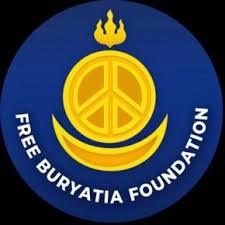
Victoria Maladaeva is the vice president of the Free Buryatia Foundation.

She said:
Dagestan, Tuva Republic and Buryatia Republic have the highest death tolls
Moscow, with 17 million, had >50 deaths.
Buryatia with only 980,000 had 364
A Buryat is 7.8 x more likely to die in the war compared to an ethnic Russian.
A Tuvan is 10.4x more likely
The biggest losses were at the beginning of the war and numbers gradually decreased.
Mobilisation was first and foremost carried out in ethnic republics
The day Putin announced this, authorities came to Buryatia at night, went into people's homes and took them from their beds.
No one was given draft notices
They even took men with multiple children, men from the same family
Endangered ethnic groups reside in Dagestan

There are very small communities of those people with populations of around 13,000
Despite this, those minorities were still drafted
There are also very small communities in the Sakha Republic.
They are so remote, helicopters are needed to be called for medical treatment
They almost never come because of how remote these communities are
Funnily enough, helicopters came immediately to draft those people upon Putin's announcement
Putin is a Russian imperialist through and through
None Russians are treated like second class citizens
Russian cultural chauvinism is seen even in small things - such as names
Putin would frequently mispronounce Kazakhstan's president's name. If you have an ethnic Buryat name for example, Russians are reluctant to use it, instead assigning you an "easier" Russian name

Kassym-Jomart Tokayev
Unfortunately, many of the people of Buryatia believe in the Russian narrative about Nazi ideology in Ukraine
It is one of the missions of the free Buryatia Foundation to help Buryats understand that this is Russian propaganda
The focus on Buryat/ethnic minority war crimes has a racial element
When an ethnic minority commits a war crime, their ethnicity is singled out
It should not matter the ethnicity of a war criminal
78 Buryat soldiers from the 11th air assault brigade were barred from terminating their contract
They were imprisoned in Luhansk.
Only Ilya Kaminskiy returned. The fate of the other men is unknown
The Free Buryatia Foundation knows they cannot help everyone but they do their best. They help people in terminating their contracts for example and have been quite successful in this.
The Free Buryatia Foundation was established to counter Russian propaganda and to protest the war.
People worldwide took an interest to this, so they founded the free Buryatia Foundation.
The Free Buryatia Foundation is the first ethnic anti war organisation in Russia
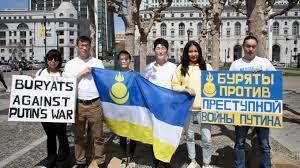
They aided in founding anti war organisations in other ethnic regions such as Tuva, Kalmykia, Udmurtia, Sakha
Many Buryats fled to Mongolia and Kazakhstan
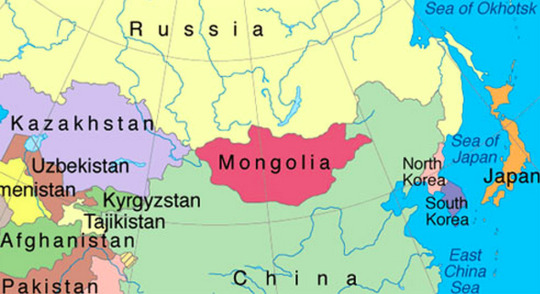
Some men were able to come back after being drafted, some were not
The economic situation for Buryatia is dire. It ranked 81st out of 85 of Russia's regions when it came to living standards
Buryats had to spend money on a list of supplies for war that Russia did not provide them
Very recently, on September 1st, Russia banned the Free Buryatia Foundation, labelling them as undesirable and anti Russian.
Here is the website for the Free Buryatia Foundation:
And here is where you can donate:
Please spread around or give what you can.
#Russia#Russian imperialism#russian colonialism#russian invasion#Ukraine#invasion of ukraine#russian invasion of ukraine#war in ukraine#Buryatia#Tuva#chechnya#Sakha#Yakutia#Kalmykia#Indigenous people of Russia#Asian Russians#indigenous russia#indigenous russian#Native Russia#Native Russians#Russian ethnic groups#Free Buryatia foundation#Free Buryatia#Anti Russia#Russian propaganda#human rights#Russian ethnic minorities
147 notes
·
View notes
Text
okay but think about Nikto.
Nikto who was not always no one. He was his mother's son, his sister's younger brother, the smiling kid from apartment 56 in the orange complex, the runt of the litter in his class.
Nikto who once had a name. A little boy who had a funny nickname that was yelled by his friends as they skipped class and ran from the guards in school. A boy who had dreams and nightmares and stupid petty fights with his classmates.
Nikto who in his teenage years buzzed his hair and started wearing darker clothes. A boy who was offered his first cigarette at 14 and coughed up half a lung after one hit. A fight with the kids from a neighboring school left his nose crooked and blood filling his mouth, but his hands were slung over his friends' shoulders and they laughed.
Nikto who watched wars break out. Had to hear it on the radio, see it on the news. Two old men talking about yet another conflict while playing chess in a park. History class in school talking about 'The Great Patriotic War', the horrors suddenly becoming too real. The need to do something pressing into his mind as he read the newspaper about an attack on a theatre by Chechen terrorists.
Nikto who's mother's face paled when he said he enlisted. His older sister who tried to tell him to go to univeristy, study and then leave to go to a different country, live a better life, a life he deserved. His grandma who let silent tears spill as she remembered how her own husband did not return to her. A 17 year old boy who made up his mind, he wanted to serve his country, answer the call of duty.
Nikto who went to training camp, passed it, but barely. A young fresh-faced boy who layed in his barrack bed and wondered if he made the right choice. He though he could never get used to the wight of his gun.
Nikto who as the years passed adapted to the harsh military life. He revelled in it. The man came a long way, no one would be calling him the runt of the lotter now. His body filled out, muscles and skin hardening, his face that held baby fat even into his late teen years all but completely dissapeared, being swapped for a five o'clock shadow and a square jaw.
Nikto who got into the helicopter with a smile, joking around with his squadmates as they set out to their next mission. The man who took down 13 hostiles by himself but was overwheled, the man who was not deemed worthy enough to go back for, the man who left at the hands of the enemy.
Nikto who finally became no one. Nikto who's mind was spliced in so many directions that he could not make out the heads or the tails of life. Nikto who was no longer a boy or a man. He was death, he was nothing.
Nikto who forgot his own name, forgot what life was like before the torture. Nikto who looked into the mirror, at the deformed thing that used to be his face. His minf trying to, but never quite coming up with a picture of what he looked like before.
Nikto who came back changed. The voice in his mind also splitting, making him think that he was no one but also everyone at the same time. A big void of bodies and sounds trapped in one broken body.
Nikto who had a chance to go back home. The door to the apartment where he supposedly spent his whole life was unfamiliar to him. The peeling paint and the rickety lock looked like things he knew, but the more he tried to remember the harder it was.
Nikto who watched the woman who was supposed to be his mother fall to her knees when he said that her son is dead. The dog tags and envelope methodically handed over to her. He watched as another woman slowly made her way over to the weeping lady, embraced her and wailed.
Wailed for a man who was dead but also alive. Screamed a long forgotten name and prayed to god, a god that Nikto himself remembers praying to during those months of being caputered. But they don't get an answer from him, just like he never did.
He mutters an apology and turns away from the door. Leaves the orange complex with the women who grieved him behind. Just as he left himself behind. he was no one. He was Nikto.
107 notes
·
View notes
Text



#russia#russian war crimes#chechnya#chechen wars#vladimir putin#war in ukraine#russian invasion in ukraine
204 notes
·
View notes
